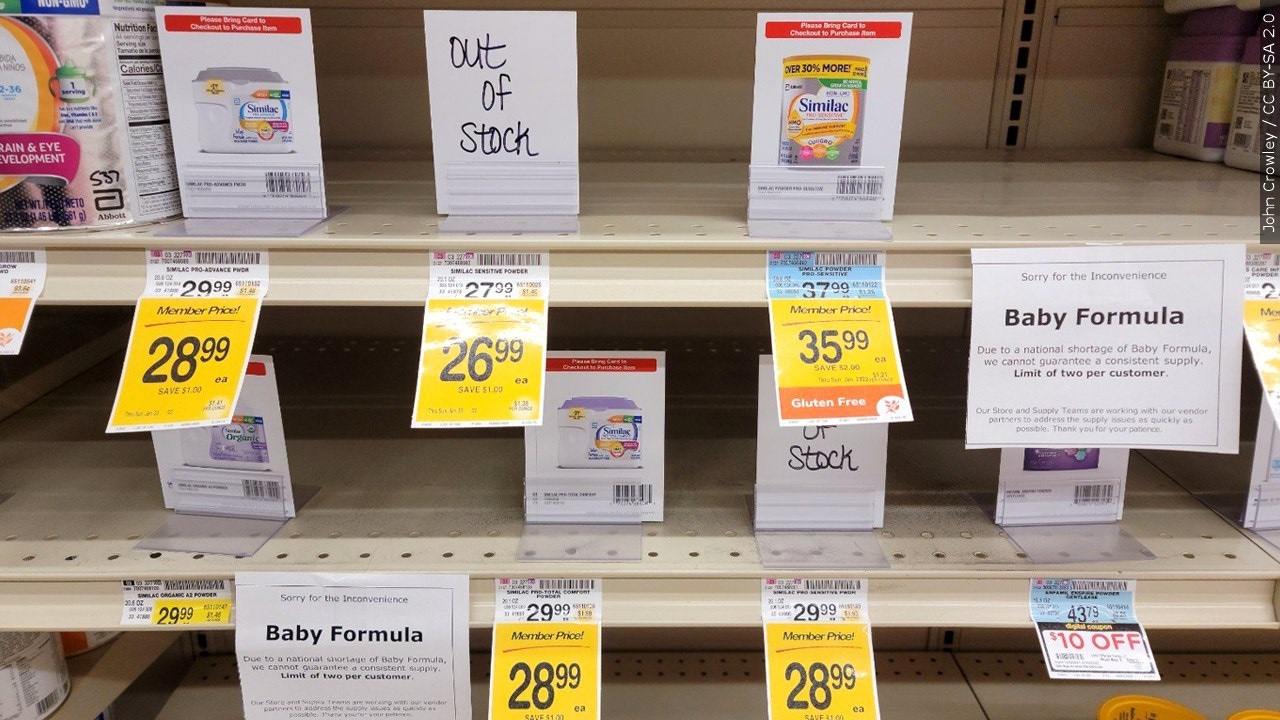Minnesota doctors have advice for parents facing baby formula shortage
[anvplayer video=”5107960″ station=”998122″]
A baby formula shortage is concerning parents across the country.
Forty percent of the baby formula supply in the United States was out of stock by April. It’s attributed to supply chain issues and a voluntary recall of three popular brands: Similac, Alimentum and EleCare.
The White House addressed the issue on Monday by saying the FDA is working with formula manufacturers to help increase production.
“What they’re trying to do in the shorthand is increase supply by working with a range of manufacturers in what their capacity is to ensure that the kinds of formula that was recalled is where they’re able to help ensure it’s on the shelves,” White House Press Secretary Jen Psaki said.
The shortage is putting stress on parents in Minnesota, including Elaina Borak. She lives in Cologne and celebrated her daughter’s first birthday on Monday.

Baby formula shortage (Credit: John Crowley / CC BY-SA 2.0)
“If this was last year when she was born, I don’t know what we would’ve done,” Borak said.
She explained they started buying a couple of extra boxes when they went to the store as a precaution months ago when there were signs of a possible shortage. Soon, they were driving to other communities to try to buy it.
“Having to go to Minnetonka, having to go somewhere closer to the Cities,” she explained.
Borak turned to the internet as formula became harder to find.
“I thought ‘Oh, I’ll just order it online,’ because if we’re not finding it at Target, I can just order it,” she said. “It worked for two or three times and then all of a sudden, I think it was last month, I went online to grab it and nothing was available. So then I was kind of nervous. We counted out what we had left and it seemed about three weeks.”
Luckily, her father located a box while on vacation in Florida. She said they’re now hoping that will hold them over as they can transition their daughter to whole milk.
“I really can’t even imagine what it would be like if we had a baby that was a few months old,” Borak said. “It’s unbelievable. I mean, something needs to be figured out.”
Physicians are encouraging parents to reach out for help if they can’t find formula.
“I think this is such a challenging problem for families,” said Dr. Gigi Chawla, the chief of general pediatrics at Children’s Minnesota.
She advises parents that they can switch to a different brand of formula if their primary choice isn’t available.
“Most of the formulas have essentially the same composition and can be readily switched back and forth,” said Dr. Chawla. “It is not our first choice, our first preference, but it is far better than any of the options for babies.”
She warns parents against watering down formula to make it stretch further. According to Dr. Chawla, increasing the amount of water could cause nutritional imbalances and lead to serious health problems.
In addition, parents should not substitute other kinds of milk for formula, nor should they try to make their own formula.
“Infant formula is highly specialized,” she said. “You are not as an individual able to match the right calories, the right nutrients that babies really need in order to grow and thrive. We really encourage parents to reach out for help when you can’t find formula.”
Dr. Eric Barth, a pediatrician at the Allina Health Clinic in Ramsey, told 5 EYEWTINESS NEWS babies could develop metabolic or electrolyte imbalances if they’re fed homemade formula.
“The longer you used a formula that was homemade, the more risk there would be that if something was off — they would develop an issue,” he said.
Barth said this is the worst shortage of its kind since he started practicing medicine.
He agrees it is OK for parents to try a new brand of formula, as long as their baby doesn’t have an allergy or health condition that requires a specific type.
“The difficulty comes if a baby has a milk allergy, a true allergy, or a health condition that requires them to be on a really specialized formula,” he explained. “But the vast majority of babies can take whatever is on the shelf.”
He suggests parents select the type of formula that’s the most similar to what their baby has been using.
“The closest to what you’re used to, what the baby is used to, is certainly a good idea but there is a saying, ‘Any port in a storm.’ Well, in this case, you might have to take whatever is available,” Barth said.
Both doctors suggest parents reach out to their pediatrician for help if they cannot find formula for their baby.